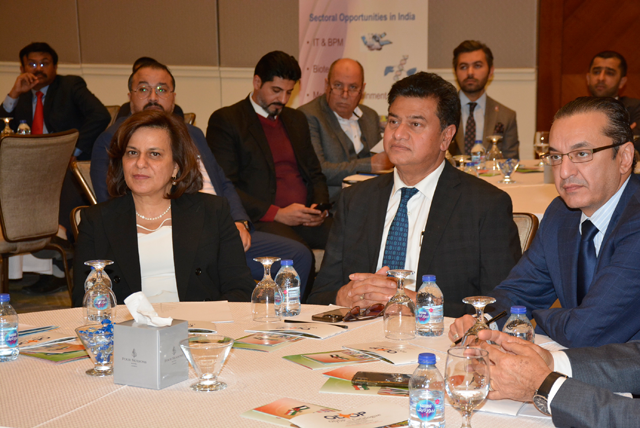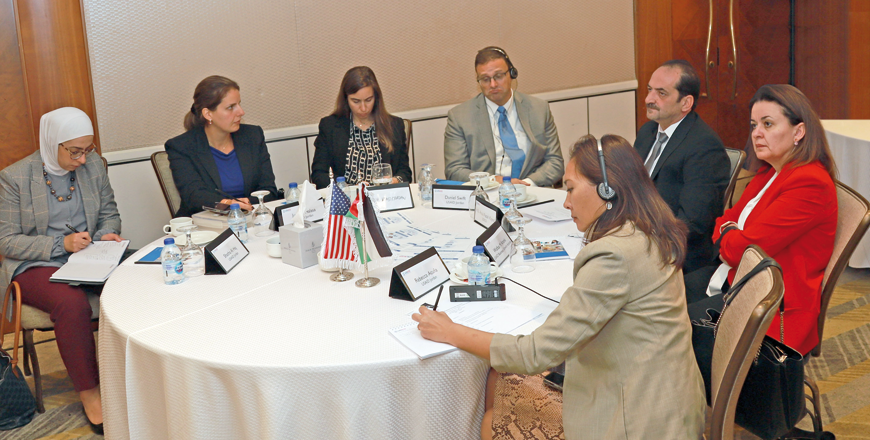You are here
Stakeholders underline public-private dialogue as key to success of SMEs
By JT - May 23,2016 - Last updated at May 23,2016

Prime Minister Abdullah Ensour tours an exhibition on the sidelines of a conference on SMEs in Amman on Monday (Petra photo)
AMMAN — Prime Minister Abdullah Ensour on Monday underlined the need to enhance public-private dialogue with the aim of empowering small- and
medium-sized enterprises (SMEs).
The premier said that SMEs are of interest to the government because they comprise some 96 per cent of the economic enterprises in the Kingdom.
He made his remarks as he inaugurated the second SMEs regional conference for Small- and Medium-sized Enterprises (SMEs), organised by the Jordan Chamber of Industry (JCI) in partnership with the Confederation of Danish Industry, the Jordan News Agency, Petra, reported.
The conference, titled “Public-Private Dialogue: Empower SMEs... Release the Potential”, aims at benefiting from chambers of industry and commerce and business organisations as tools to improve the business environment and public-private dialogue, Petra said, quoting organisers as saying.
It also aims at providing the private sector with the necessary means to help it establish and facilitate dialogue that the public sector, which should help enhance the regulatory environment of businesses through “untraditional tools”.
Ensour noted that SMEs provide 50-60 per cent of the total job opportunities in the world and contribute to around 85 per cent of the gross domestic product (GDP) in many countries.
He added in his opening address that the government works on supporting new leading ventures implemented through its various institutions like the Jordan Enterprise Development Corporation, which has supported 1,000 economic enterprises through grants and technical support since 2009.
Meanwhile, the Development and Employment Fund provided soft loans worth JD14 million during the first third of 2016 to finance 2,152 projects and thus created more than 4,000 job opportunities, Ensour said, adding that the Central Bank of Jordan also launched a programme to offer loans to new small enterprises that amounted up to JD35 million.
The prime minister said the government added texts in the 2025 Vision, Jordan’s comprehensive economic and social blueprint, in support of SMEs and start-ups.
SMEs form more than 90 per cent of enterprises in the Middle East and North Africa, amounting up to 23 million enterprises, whose contribution to the economic performance indicators is limited, Petra reported.
For her part, Industry, Trade and Supply Minister Maha Ali said SMEs face many challenges, including competition, the small markets, weak administrative and marketing capabilities, high energy costs and the hardships entrepreneurs have to deal with when they seek funding because they are still start-ups and thus cannot offer satisfactory collaterals.
She added that there are SMEs that led the growth of some of the biggest economies in the world, which is why they should be supported in accordance with the best international practices in the field.
JCI President Adnan Abul Ragheb said the two-day regional conference is part of the chamber’s support to SMEs, voicing hope that it would result in recommendations that spur dialogue between public and private sectors to be presented to the government for action.
For his part, head of the General Union of Arab Chambers of Commerce and President of the Jordan Chamber of Commerce Nael Kabariti said the expertise of many countries proved that SMEs are able to achieve desirable economic development if provided with the proper climate and necessary funding.
He urged concerned authorities to support the private sector’s initiative for its role in enabling SMEs and bridging the gap between funding institutions and the enterprises, describing it as the biggest challenge in the field.
Director of SMEs and Entrepreneurship at the Confederation of Danish Industry Sidsel Holst commended the efforts of organisers in holding the conference for the second time with the JCI as part of the cooperation.
She said that the general environment for SMEs is the same regardless of the country, with universal demands, on top of which is obtaining funds, the need for transparent and honest competition and a facilitating regulatory environment.
Related Articles
AMMAN — Ninety-seven Jordanian companies, including 20 women-owned or partnered firms, on Thursday signed agreements for the first phase of
AMMAN — The Indian embassy on Monday held a seminar titled India-Jordan Business Meet in Amman with the participation of Invesment Minister
AMMAN — The USAID Business Growth Activity, in collaboration with the Jordan Enterprise Development Corporation (JEDCO), held a public-priva



















